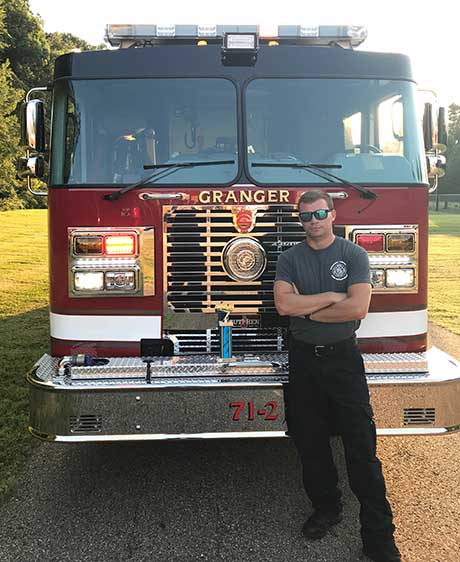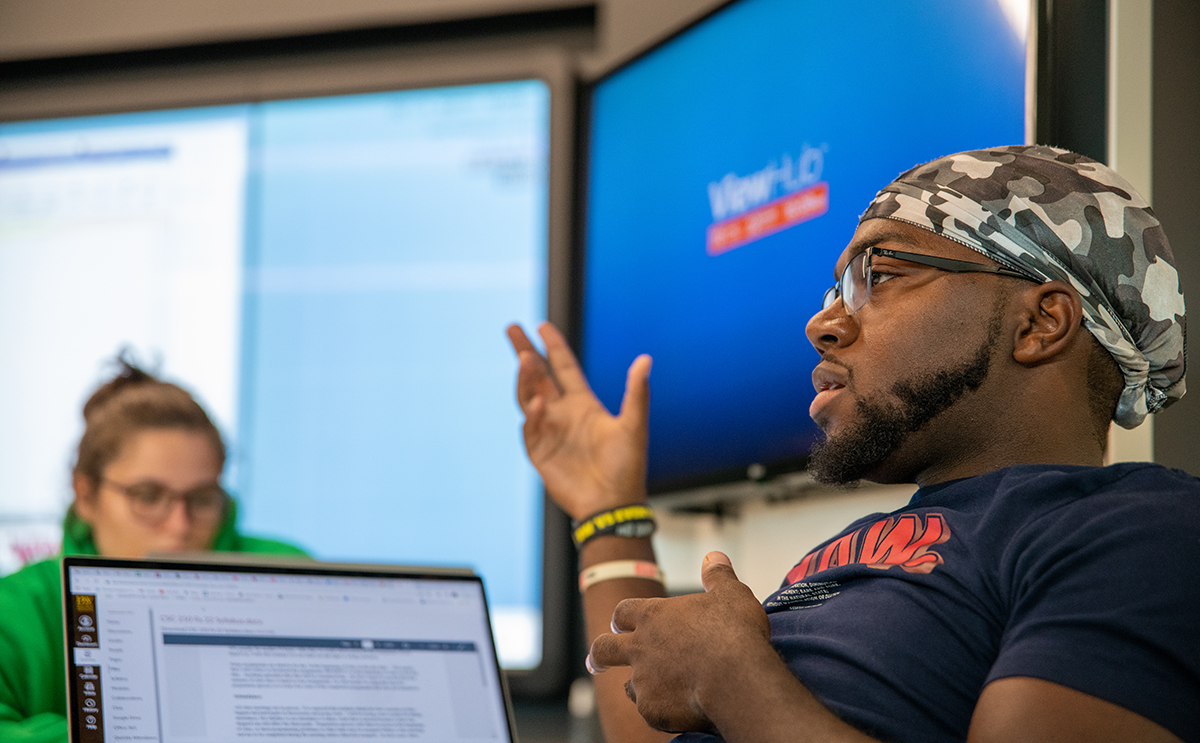Goal-scoring, life-saving Logan Davis is living out his career dreams step by step
 A
single
911
call
changed
the
course
of
Logan
Davis'
life.
A
single
911
call
changed
the
course
of
Logan
Davis'
life.
When Davis, a senior psychology major, was in high school, his father suffered a severe stroke and paramedics responded to transport him to the hospital.
What Davis remembers most is that the fire department took time to focus on him as well as taking care of his dad.
Now, Davis puts that life-altering event into perspective as he fields 911 calls day and night as a certified emergency medical technician (EMT) in the volunteer, part-time Granger Township Fire Department.
Turning bad into good
"A bad thing turned into such a positive thing," Davis recalls, "because my dad's stroke now has given me the drive to make sure patients and their families are experiencing the same thing that I did, I want to do the best I can to comfort them in the time that they need it the most."
His dad's stroke played a big role in the decisions Davis would make leading up to and throughout college: what he would study, what his career would be and also whether or not he played soccer.
"My dad never got to see me play my junior year of high school," Davis explained. "I knew I wanted to continue so that way, he could see me play. I just had such a love for the game that I knew I couldn't let it go at the end of high school."
Right fit
When it came down to choosing a college, Davis was already familiar with BW thanks to his sister Tanya, who was a standout on the softball team. In addition to wanting to play soccer, his checklist also included being able to commute to school and stay at home to help with his dad.
BW head men's soccer coach Reid Ayers knew about Davis as he played for BW alumnus Bob Sefcik at Medina Highland High School. Since arriving at BW, the senior forward has delivered with eight career goals and two assists, including four game-winners.
"Just with his energy, he was a combative kid, a competitive kid, you could just see that," Ayers said. "It was something we felt we needed in this team."
Mapping a plan
Ultimately wanting to pursue a career as a life flight critical care nurse, Davis chose to study psychology for his undergraduate degree to get an insight into the human mind and how it affects a person's behavior.
He also successfully completed emergency medical technician (EMT) school at University Hospital's Parma Medical Center last fall and is currently enrolled in the Fire Training Academy at Cuyahoga Community College.
"He is one of those rare kids who knew what he wanted to do, he mapped out a plan and has done that," said Ayers.
The road to EMT
EMT school consists of clinical time in a hospital setting, ride time, lectures and practical days, after which the student is required to pass the 70-120 question National Registry for Emergency Medical Technicians exam in order to get certified.
Davis purposefully had knee surgery before he took the exam to lay him up in bed for a week, forcing him to study the 1,000-page prep book. He got kicked off the exam at 70 questions, which meant that "you either did really well or really bad that the remaining 50 questions wouldn't be able to help you pass."
Twenty-four hours later, he opened an email that read, "You successfully passed your national exam." All his hard work paid off, and it was on to the next step: becoming a certified firefighter.
Firefighter certification
Although the fire academy is structured a lot like EMT school with lectures and drills, it demands more out of Davis and his fellow students physically and emotionally.
"They put us in situations that most people couldn't handle every day and we're doing it three times a week," Davis said. "It's very fun because not many people get to walk into a burning building to learn. That's something I love about it is that we can learn through watching fire grow and fire behavior."
Last steps to the dream
In the fall of 2019, Davis will enroll in BW's Accelerated Bachelor of Science in Nursing program as he works toward his goal of becoming a life flight critical care nurse.
Davis hopes to start his career at UH MedEvac and then eventually end up at Cleveland Metro Life Flight, which handles more trauma. Prior to becoming a life flight nurse, however, he will have to spend 3-5 years working in an intensive care unit, in addition to having fire department experience.
"Life flight is for the most critically ill, and I want to be able to help people on their worst days," Davis said. "Along with being a paramedic, going into somebody's house on their worst time is always what I've been about."
For now, though, Davis keeps his pager and his radio on any time he's home and will respond to a 911 call day and night for anyone in need, remembering that night in high school that changed the course of his life forever.



